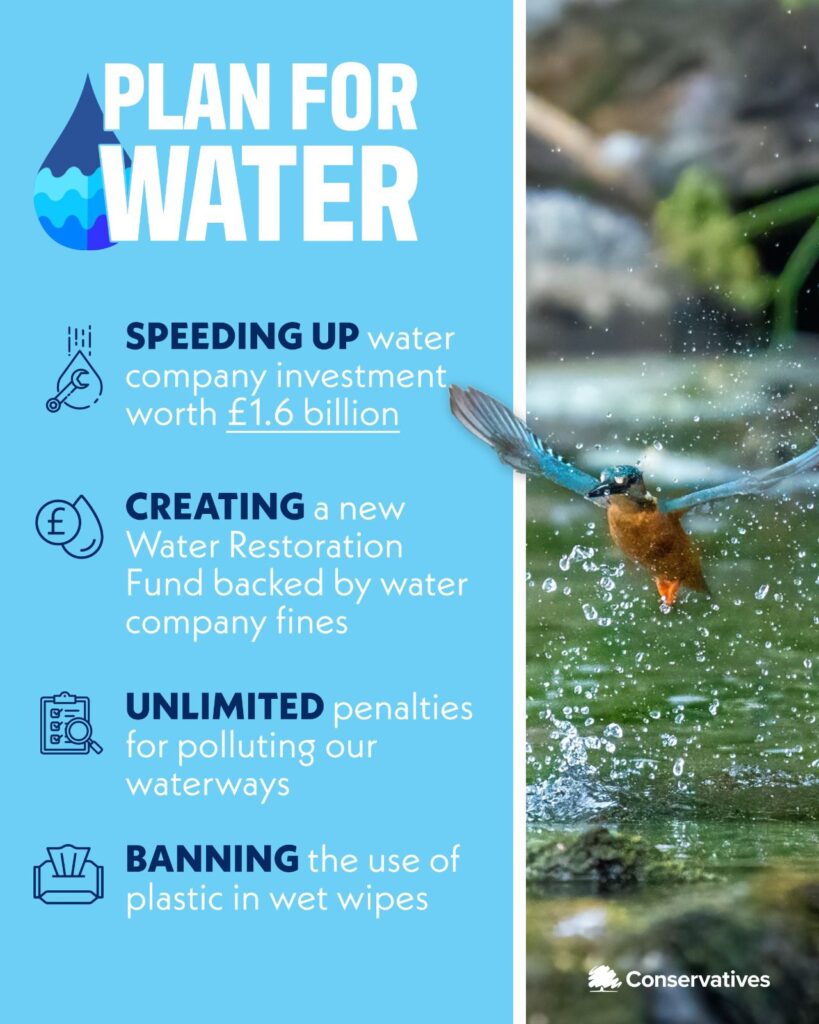I know an area of acute local interest is the condition of our waterways. We are blessed to live in such a beautiful part of the country, and it is incumbent on us all to ensure that our rivers and waterways are maintained.

Of course, none of us want to see sewage entering our precious waterways. My ministerial colleagues and I have always been clear: sewage in our rivers is unacceptable. To this end, the Government is committed to tackling storm overflows, protecting public health, and safeguarding the environment.
This week, Environment Secretary Steve Barclay announced that up to £11 million in water company environmental fines and penalties will be reinvested back into a new Water Restoration Fund.
All water company environmental fines and penalties since April 2022 will be used to directly improve the water environment. The Water Restoration Fund will offer grant funding on a competitive basis to support local groups, farmers and landowners and community-led schemes, bolstering their capacity and capabilities for on-the-ground projects to improve the water environment.
The £11 million in fines and penalties will mean £3,334,000 of new investment in the region covered by Thames Water.
https://www.gov.uk/government/news/crackdown-on-water-firms-sees-millions-invested-into-local-action
This builds on years of work to address the quality of our water. This Conservative Government is the first to take significant steps to address storm overflows. In August 2022, the Storm Overflows Discharge Reduction Plan was launched, setting out stringent targets to protect people and the environment, backed up by up to £60 billion capital investment, which is the largest infrastructure programme in water company history. Legally binding through the Environment Act 2021, the plan prioritises storm overflows that could cause the most harm while balancing the impact on consumer bills.
The Department for Environment, Food and Rural Affairs will tighten permits issued to water companies for storm overflows to ensure water companies deliver the Storm Overflows Discharge Reduction Plan’s targets. The Secretary of State for Defra wrote to water companies, asking for further action at pace to tackle sewage discharges as a priority.
The Secretary of State also recently announced that Defra has fast-tracked investment of £180m over the next 12 months, which is expected to prevent more than 8000 sewage spills from polluting English waterways. The accelerated improvements, which will be delivered by April 2025, support the targets under the Government’s Storm Overflows Discharge Reduction Plan. This is alongside numerous infrastructure projects to reduce sewage spills in our waterways nationally.
The Government, the Environment Agency and Ofwat are working to increase the accountability of water companies. This includes increasing monitoring of the frequency and duration of discharges, from approximately 7 per cent in 2010 to 100 per cent oversight of overflows now, meeting the ambitious target set by the Government to do so by the end of 2023. This shows the public when discharges are happening and helps the Government and regulators to better hold water companies to account for illegal sewage spills.
Finally, following a consultation on strengthening fines for polluters, Ministers tabled legislation to remove the limit of £250,000 that can be imposed for environmental offences. This will mean that penalties can be proportionate to the degree of environmental harm and culpability and can act as a powerful deterrent. This will also offer regulators a quicker method of enforcement than lengthy criminal prosecutions, although, the most serious cases will continue to be taken through criminal proceedings. As set out in the Plan for Water, future environmental fines from water companies will be re-invested into a new Water Restoration Fund.
When there has been so much progress over so many years, I regret that this issue has been so profoundly politicised. It is sad to see that on an issue which should not be partly political, the Labour Party and the Liberal Democrats have abandoned honest debate in favour of untruths and disingenuous solutions which not only would not work but which have also scared the public.
For instance, some have suggested that sewage discharges have become more common, and even that the Government has legalised the dumping of sewage. Neither is true.
There has been no increase in the levels of discharges. However, one of the reasons that there are more reports of these discharges is that the government has required water companies to monitor more of their overflow pipes. In 2016, only 800 were monitored, but by 2020, over 12,000 were. Water companies are obliged to monitor all 15,000 by the end of this year.
Similarly, the discharge of sewage from storm overflows remains subject to strict rules under the Urban Wastewater Treatment Regulations, which have not changed, and have been the case since before Royal Assent of the Environment Act. Storm overflows should only be used under strict permit conditions.
I know that many in Wycombe remain concerned about reports of sewage being released into our waterways. The Government is working at pace to address unacceptable levels of discharge, while not causing needless disruption and protecting working families from significantly higher water bills.
If you would like to get in touch with me, please email: steve.baker.mp@parliament.uk. If you would like my help with a particularly urgent issue, please phone my constituency office on 01494 448408.